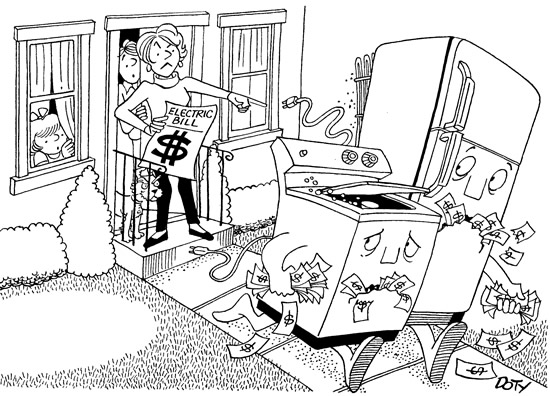December 2002
Older appliances-not teenagers-are most wasteful
Want to save some serious cash on your electric bills-without banishing family members who forget to turn off lights? If you're like most homeowners, you're probably not even aware that "energy gobblers" are lurking in your basement, your kitchen or your garage, and they're eating up your money!

The biggest culprits are old refrigerators. If you use a "retired" fridge to store frozen foods, holiday dinners and "emergency" six-packs, the best advice is to get rid of it. How much could you save by throwing out that still-functional dinosaur? More than $100 per year is possible and, because homeowners typically hold on to refrigerators for 20 years or more, that adds up to a whopping $2,000-or more. If your refrigerator is even 10 years old, it will be due for replacement in a few years anyway, and in the meantime you could be saving a lot of energy-and dollars. Old washing machines, clothes dryers and air conditioners are almost as bad, especially if they're relics from the 1970s, before environmental awareness brought about serious energy-efficiency improvements in appliances. These energy gobblers shouldn't find a safe haven in any home. And don't even think of passing your bogeys on to someone else. If you read the news, you know that energy shortages affect everyone.
Home appliances are far more energy-efficient now than they were even a few years ago. Manufacturers today employ a variety of methods to improve their efficiency, such as increasing the amount of copper in motor windings. The extra copper, which helps by decreasing electrical resistance, adds a small incremental cost to the motor but pays big dividends in reduced electricity bills over the life of the appliance.
The Price of Efficiency
Energy-efficient appliances don't necessarily cost more to buy. Shoppers can find energy-saving models suitable for every budget.
When you shop for a new appliance, pay special attention to the yellow EnergyGuide labels that are required on most new major appliances. The labels are based on U.S. government tests and include estimated energy-use costs as well as comparisons to similar appliances. Of course, the actual operating cost of any appliance depends on how you use it and your local utility rates, but the information found on the labels is both dependable and helpful.
Find out how copper is used to make homes more energy efficient. You can also visit our Building Wire section for more information about residential electrical wiring.
